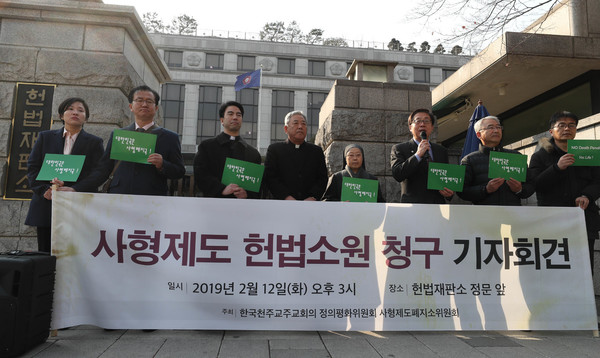South Korean bishops call for an end to the death penalty
- Catholic News AgencyFeb 15, 2019
- The South Korean bishops’ conference has called for an end to the death penalty, and asked the nation’s Constitutional Court to consider whether capital punishment violates South Korea’s constitution.
“The capital punishment system treats criminals not as human beings capable of moral reflection and improvement, but simply as a means of defending society. If the aim were to permanently segregate criminals to protect society, that could certainly be achieved through life imprisonment or penal servitude without the possibility of parole, which represent less of a restriction on basic rights,” the bishops said in their constitutional appeal, filed Feb. 12.
“All individuals’ lives possess the same value, and that life is of absolute significance to each individual,” a spokesman for the bishops’ campaign told the Hankyoreh newspaper.
“It is no different even for criminals who have committed atrocious acts that violate and harm the life and human rights of others.”
The South Korean bishops have collected the signatures of 102,517 South Koreans requesting that capital punishment be replaced by life imprisonment, Hankyoreh reported.
The nation’s Constitutional Court has ruled previously, both in 1996 and in 2010, that the death penalty does not violate the South Korean constitution.
61 people await execution on South Korea’s death row, according to death penalty abolition groups, but no one has been executed in the country since 1997.
Pope Francis has been an outspoken opponent of the death penalty, revising the Catechism of the Catholic Church in 2018 to call execution “inadmissible.”
There are nearly 6 million Catholics in South Korea, comprising more than 10 percent of the country’s population. - CRUX, 15/2/2019
S. Korea’s Catholic bishops call for legislation banning capital punishment
Posted on : Feb.13,2019 17:51 KST Modified on : Feb.13,2019 17:51 KST
Nation’s Catholic Church collects 102,517 signatures in petition

Kim Hyeong-tae (third from right), chairman of the subcommittee for the abolishment of capital punishment of the Catholic Bishops’ Conference of Korea (CBCK) justice and peace committee, announced the committee’s submission of a Constitutional appeal against the death penalty on Feb. 12 in front of the Constitutional Court of Korea. (Baek So-ah, staff photographer)
“The capital punishment system treats criminals not as human beings capable of moral reflection and improvement, but simply as a means of defending society. If the aim were to permanently segregate criminals to protect society, that could certainly be achieved through life imprisonment or penal servitude without the possibility of parole, which represent less of a restriction on basic rights.”
The capital punishment abolition subcommittee of the Catholic Bishops’ Conference of Korea (CBCK) justice and peace committee submitted a Constitutional appeal on Feb. 12 against the death penalty.
In a press conference the same day before the Constitutional Court in Seoul’s Anguk neighborhood, chairman of the subcommittee and Duksu Law Offices President Kim Hyeong-tae presented the reasons for the death penalty’s abolition.
Also present was justice and peace committee chairman Bishop Constantine Bae Ki-hyen, who urged the Constitutional Court to conduct a sincere review. The Catholic Church has collected 102,517 signatures to date in a campaign launched at individual churches nationwide last December to request legislation abolishing capital punishment and imposing life imprisonment instead.
The figure behind the Constitutional appeal request is an individual (identified by the initial “K”) who was sentenced to lifetime penal servitude by the first criminal division of the Bucheon branch of Incheon District Court last December after being arrested and indicted for parricide. Kim Hyeong-tae, who previously chaired the Catholic Church’s human rights committee, assisted K in submitting a constitutionality review recommendation and Constitutional appeal request.
The court ruling on K’s case last year rejected a recommendation for a review of the death penalty’s constitutionality, arguing that capital punishment serves as the “strongest deterrent against crime.” Kim stressed, “All individuals’ lives possess the same value, and that life is of absolute significance to each individual.” “It is no different even for criminals who have committed atrocious acts that violate and harm the life and human rights of others,” he insisted.
Kim also noted, “While the Constitutional Court has ruled the capital punishment system constitutional in the past, the number of opinions finding it unconstitutional has risen from 7-to-2 in 1996 to 5-to-4 in 2010, and many of the Constitutional Court justices have stated their belief that the death penalty should be abolished in confirmation hearings during their candidacy.”
“With two-thirds of South Koreans stating in a National Human Rights Commission of Korea survey last year that they support abolishing the death penalty provided that an alternative form of punishment is introduced, we look forward to a wise decision from the Constitutional Court,” he said. By Cho Hyeon, religion correspondent - Hankyoreh, 13/2/2019

No comments:
Post a Comment